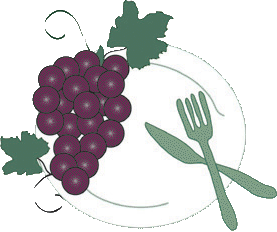
Urbanites we are, talking, eating and navel-gazing as if our existence in the Big City were the highest form of life known to man. (And, hey, it's not just here in Seattle. Could just as well be Noo Yawk or Paree.) To become aware of our intellectual provincialism, you have to cross the Cascades.
Beyond the mountains lie the fields and vineyards whose bounty feeds us, but, even more important, the real strength of this land: Wazzu, Washington State University, whose scientists and researchers bridge the gap between agricultural theories, laboratory tests, and farmland practices.
At a gala celebration in the lobby of Benaroya Hall, "A Taste of WSU" presented a tables staffed by a dozen chefs whose dishes used local ingredients (salmon, elk, lamb, cheeses, shellfish, vegetables). Surrounding them were show-and-tell displays of academic projects, from endangered species recovery to methane digesters, that have a direct impact on the food we eat.
The danger, not to be underestimated, is Frankenfood, when technology trumps terroir. But "Food Science" is not an automatic non-sequitur. For every project like "Automation & Mechanization" there's another on protecting bird flocks, or compost research, or pesticide safety. Climate-friendly farming and low-impact storm-water systems are getting attention, along with humble crops like peanuts (a potential biofuel, not to mention delicious). WSU runs a program, for example, that helps ensure sufficient grazing habitat for elk, and Oceanaire's Eric Donnelly produced some elk tacos to demonstrate the program's viability.
At the center of the room, the Seattle chapter of Chefs Collaborative. (VP Zach Lyons, a food and ag writer and familiar figure at farmers markets, was the event's lead organizer.) The concept of connecting our state's top ag research institution with some of Seattle's top chefs: sheer genius...if you pay attention.
Just as wine is made in the vineyard (with a little help from the folks in the cellar), dinner is made on the farm (with just a little help from the folks in the kitchen). It's heartening to know that we have professors who study ways to improve transportation, keep bees healthy, reduce rural poverty, and provide technical assistance to small farmers, and that (once a year, at least) there's a forum where they can see the results: on the plate.
Posted by Ronald Holden at August 30, 2008 4:00 PM | TrackBack

The International Kitchen
Cooking school vacations in Italy, France & Spain.


 Who links to me?
Who links to me?